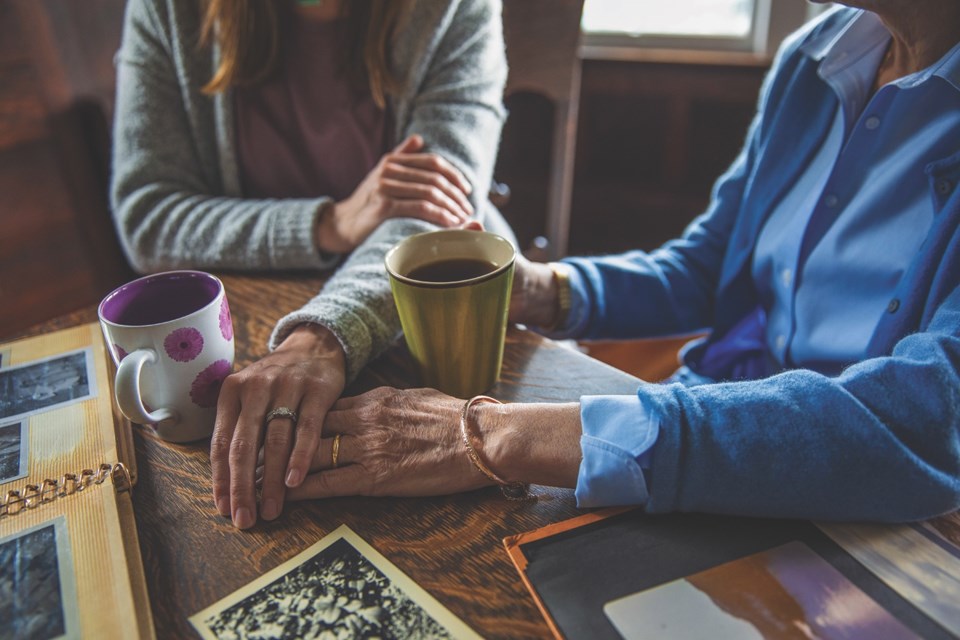Q: What is considered elder abuse, and where can I get help for someone?
A: To speak to this very important topic, I connected with Vicki Dobbyn, the coordinator for the Sunshine Coast’s Community Response Network (CRN). CRNs across B.C. – made up of local service providers and community members – work together to raise the awareness of abuse, neglect and self-neglect of vulnerable adults, with the aim to prevent it from happening.
Abuse and neglect are much more prevalent than we realize as a lot of it is hidden and not reported. The Ministry of Health reports that as many as one out of every 10 B.C. seniors will experience some form of abuse in their later years. A sign of abuse or neglect could be as simple as noticing a person is no longer participating in their usual activities. Abuse and neglect are often at the hands of someone close to the vulnerable adult, such as family member or caregiver, which is why it may not be obvious to the public or those on the outside.
Elder abuse can take many forms. These can include: Physical abuse, such as rough treatment, slapping, shaking, or punching; mental or emotional abuse (also known as psychological abuse) includes things like severe and continuing intimidation, humiliation, isolation and exclusion from events, activities and decision-making; sexual assault includes any unwanted or exploitative sexual behavior, including harassing, assaulting or using adults for sexual purposes without their consent; financial abuse includes misusing money and property, taking possessions by coercion, influencing the making of a will, power or attorney or representation agreement, or cashing cheques or using bank accounts without authorization; medication abuse includes withholding medication that the adult needs or giving too much or too little medication; violation of entitlements is a type of abuse such as censoring mail, invading or denying privacy or denying access to visitors, restricting the movement of an adult, or withholding information to which the adult is entitled.
In all the materials Vicki shared with me on this topic, it is clear that when it comes to preventing and stopping elder abuse, it really takes a village to create a safety net that can watch for things that don’t feel right, or to look for circumstances or behavioural changes in an older person that may indicate abuse. Isolation is a key risk factor in abuse and neglect. That is why it’s up to everyone – family, friends, neighbours, and community connections such as social groups, healthcare workers, retail workers and financial institution staff – to look deeper into a person’s situation.
If someone you know may be experiencing abuse or neglect, a first step is to simply ask how they are doing and be open to listening, without judgment, blame or without trying to fix it. According to Dobbyn, this is often a start towards offering support and referral to community resources.
There are many resources to connect with if you think you, or someone you know, is the victim of abuse or neglect. For general information you can call SAIL (Seniors Abuse and Information Line) at 1-866-437-1940 where trained counsellors can answer your questions. If you want to discuss a situation you are concerned about you can call Vancouver Coastal Health (VCH) Home and Community Care locally at 604-741-0726 or VCH Mental Health Services here on the Coast, 604-885-6101. VCH staff will keep your discussion confidential and will follow up with support and investigation if needed. If immediate safety is a concern, call the RCMP at 911 as they are also trained to make the appropriate response.
One important provincial resource to keep in mind is B.C.’s Public Guardian and Trustee (PGT) at 1-800-663-7867. When the PGT receives reports or allegations of financial abuse, neglect or self-neglect, they will gather information and determine if further investigation is required. In terms of initial support, they can provide information on options available to help the adult and initiate an investigation if required.
For those who’d like find out more about elder abuse and how to prevent it, I encourage you to connect with the Sunshine Coast CRN. By connecting with them, you can find out how your group or organization can take a more proactive role in preventing elder abuse, and you can also request a copy of their handbook called “Recognizing and Responding to the Abuse and Neglect of Vulnerable Adults.” CRN Coordinator Vicki Dobbyn can be reached at 604-740-7061 or [email protected].
Angie Theilmann is an information and referral specialist at the Sunshine Coast Resource Centre, your community information hub. The Resource Centre is open Monday to Thursday 10 a.m. to 3:30 p.m. Appointments are recommended to be sure we are available to help you. Contact us: [email protected] or 604-885-4088.



